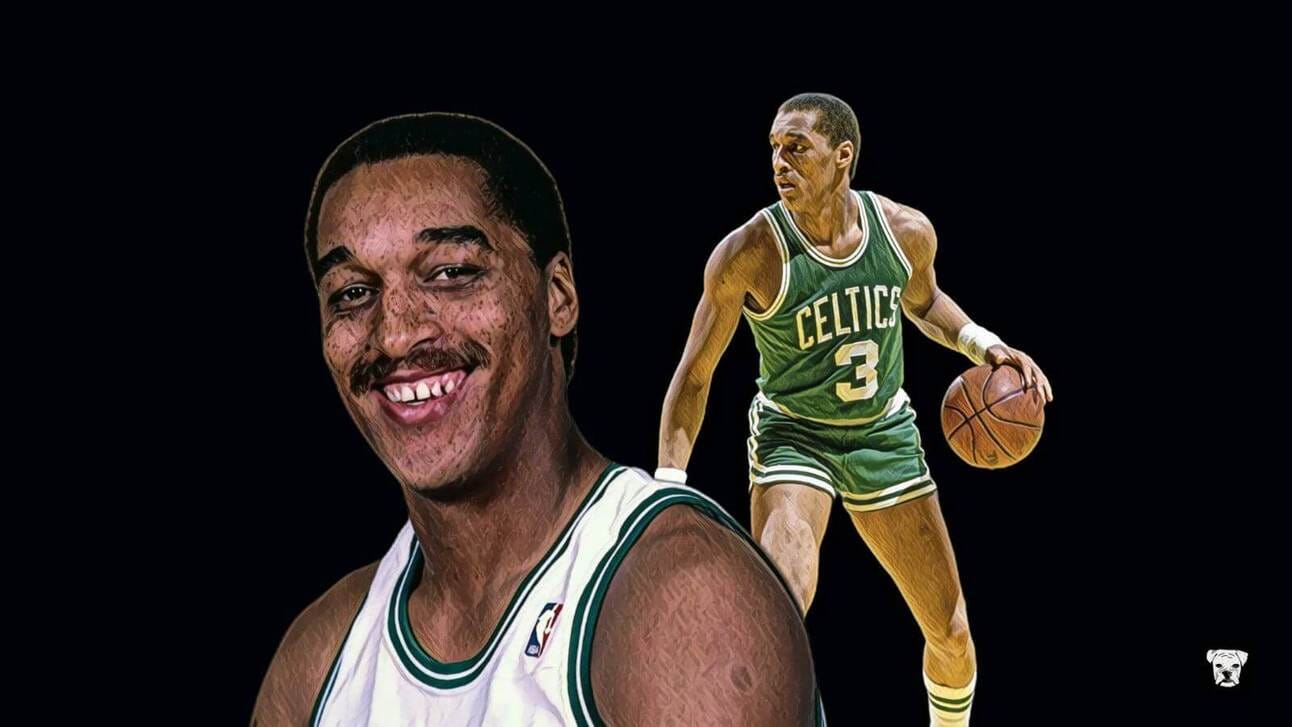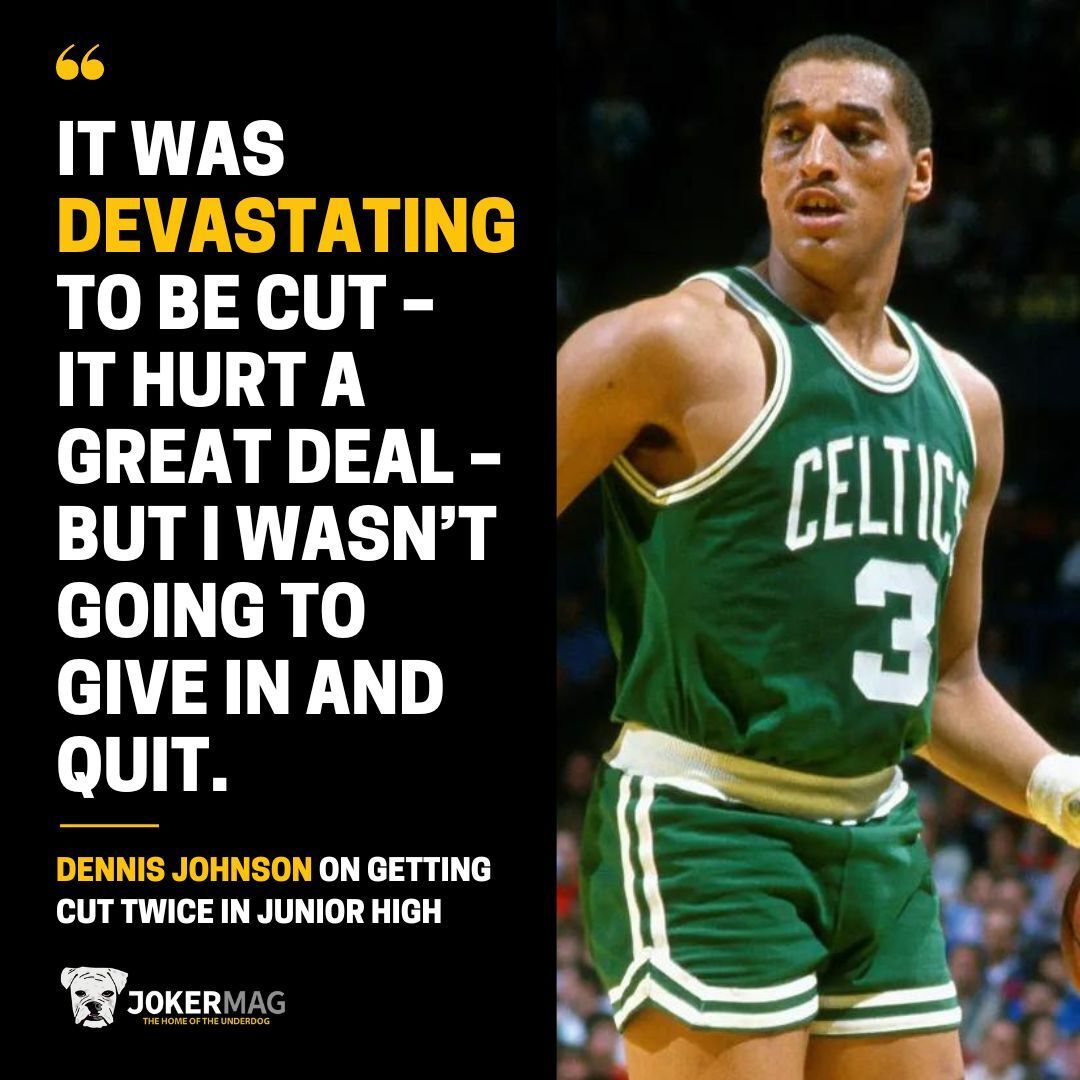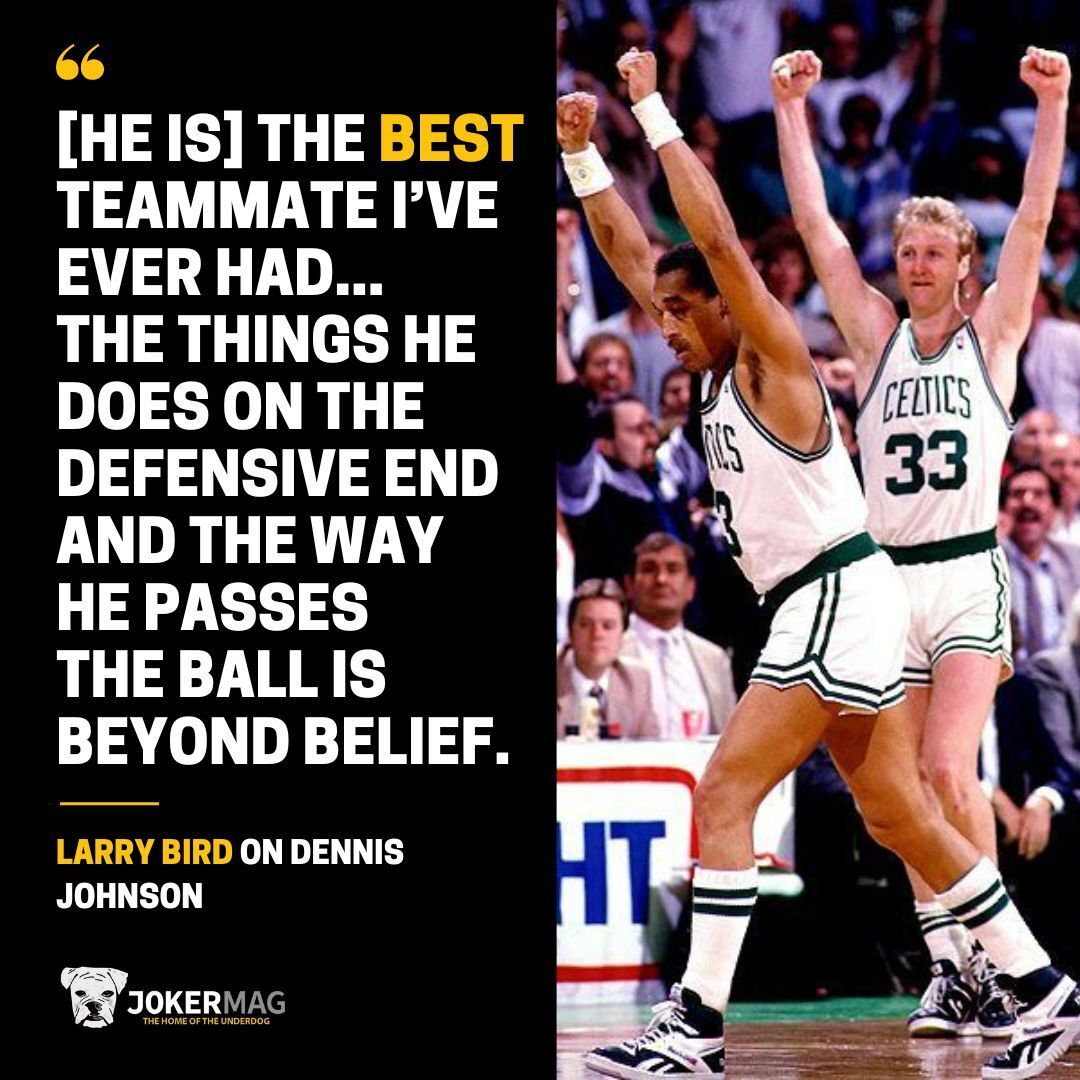In today's edition...
After warming the bench in all four years of high school, he landed a factory job making $2.75 an hour.
“Light years away” from a career as a pro athlete.
What happened next changed everything, launching him from obscurity to Larry Bird’s favorite teammate.
Let’s dive in 👇
UNDERDOG TRIVIA 🤔
Today's question is brought to you by The Underdog Mentality – “inspiring, gritty, and exactly the kind of read that makes you want to chase something big.”
Which famous rallying cry did Mets relief pitcher Tug McGraw popularize in 1973?
Tap your pick to reveal the answer in a new tab – or scroll down to Extra Innings below!
How Dennis Johnson Fought His Way From Forklift Driver to 3-Time NBA Champion
No time to read now? Click here to save it for later 🐶
He sat on the bench as a high school senior and worked as a forklift operator after graduation.
So how did he become a 3-time NBA champion?
Born and raised in Compton, California, Dennis Wayne Johnson faced the struggles of not only living in the inner city but also being part of a massive family.
As the middle child of 16 kids (yes, sixteen), Dennis and his siblings were supported by their parents – mom was a social worker and dad a bricklayer.
"We always looked out for each other," he said in a 2002 interview.
"The siblings would step in and help whenever our parents were away."
While he grew up a baseball fan, it was Johnson’s father who taught him basketball at an early age.
However, Mr. Johnson was not a great shooter, according to Dennis (who later gave his dad credit for his erratic jumper).
Despite enjoying the game, Johnson struggled for playing time due to his lack of natural talent and size.
He got cut from both his seventh and eighth-grade teams, which became a turning point for him.
"It was devastating to be cut – it hurt a great deal – but I wasn’t going to give in and quit," he said.
"I decided to prepare myself so that I could play the game to the best of my ability. I wanted to improve...So I went out and worked hard to improve. This lesson stayed with me far beyond junior high basketball, and has really touched every aspect of my life."
Standing just 5’9” in high school, Dennis suited up for the Dominguez Dons and progressed slowly.
He made the C team as a sophomore, JV as a junior, and was a Varsity bench player as a senior.
According to NBA.com, he "played only a minute or two each game."
Obviously, with little playing time, a future in competitive basketball wasn’t exactly in the plans for him after graduation.
“I was never a player in high school,” Dennis admitted.
“I grew three to four inches after high school.”
Taking up a job as a warehouse forklift operator after graduation, Johnson earned $2.75 per hour.
Now let's remember, this was the early 1970s, and that amount would equal about $19 today.
While he didn't mind the work, Dennis couldn't shake the feeling of wanting more out of his life.
"There’s absolutely nothing wrong with these types of jobs, and my hat goes off to the people who work them," he said.
"[But] I just wasn’t satisfied, and I knew that there had to be other opportunities out there."
With time to work on his game at night and on the weekends, Johnson took the bus to team up with his brothers in a local rec league.
He became a “basketball junkie”, and with hard work and a relentless hunger for competition, he held his own.
During that time, he hit a growth spurt and grew to 6'3".
He got stronger – developing "rocket launcher legs" – and quickly became one of the best players on the court.
It was during one of his rec league runs that Los Angeles Harbor College head coach Jim White took notice.
Impressed with Johnson’s tenacity on the defensive end, the coach offered him a spot on the team.
Trading his warehouse job and rec league jersey for textbooks and a college uniform, Johnson became the focal point of the Seahawks' march to the state JUCO championship.
According to an old interview, Dennis showed "both great promise and a flashpoint temper", which led to him getting kicked off the team a total of three times in two seasons.
Despite averaging 20.2 points and 13 rebounds en route to earning the MVP award, he received minimal scholarship offers.
So, with Pepperdine University being the only NCAA Division I school to show interest, he relocated an hour from Compton to suit up for the Waves.
But during December of his first and only season playing for coach Gary Colson, Johnson’s house burned down.
“His mom wanted him to drop out of school, but I convinced him to stay,” Colson said.
“We talked and were able to work it out. She was a great mother: not many people could take care of 16 kids.”
After returning to school, Dennis helped the Waves to a top-20 ranking and advance to March Madness.
Although he shot just 3-9, Johnson’s 10 points, 5 assists, and 6 rebounds added to his tenacious defense, helping the Waves defeat the Memphis Tigers to advance to the second round.
Squaring off against a Marques Johnson (no relation) led UCLA Bruins team, he played a much better game, finishing tied with a team-high 16 points in a nine-point loss.
Although he was just a junior, Johnson applied for the 1976 NBA Draft.
Selected by the Seattle SuperSonics with the 29th pick, DJ was reportedly "shocked" that an NBA team was willing to take a chance on him.
He quickly signed on the dotted line and earned approximately $40,000 for his first season – a heftier paycheck than the forklift days.
In five years, Johnson went from being a high school bench player to running in rec leagues to ultimately earning an opportunity to play in the best basketball league on earth.
In his first season playing for Bill Russell, he played the role of a combo guard, sitting behind Earl “Slick” Watts and “Downtown” Freddie Brown, averaging 9 points and just under 4 rebounds in 20 minutes.
Unfazed by the backup role, Johnson’s playing time and numbers increased during his second season, one that saw the SuperSonics advance to the NBA Finals against the Washington Bullets.
Holding a 3-2 series lead, the Sonics had two chances to put the Bullets away but ended up getting crushed 117-82 in Game 6 and lost 105-99 in the seventh game.
With Lenny Wilkens taking over the coaching reigns, Johnson was promoted to the starting five.
Unfortunately, DJ’s worst two games of the season came during the Sonics’s biggest, going 4-16 and 0-14 in the team’s attempt to capture their first NBA title.
Like any true professional, Johnson put the series behind him as he led the Sonics back to the 1979 NBA Finals and a rematch with the Bullets.
“That 0 for 14 was good for me in a way," he said.
"It was part of a growing process. I learned a lot. I don’t know if it’ll ever happen again, but I plan not to have it happen.”
Behind Johnson’s Finals MVP-worthy 22.6 points, 6 rebounds, and 6 assists, the SuperSonics knocked off the Bullets for their first NBA championship.
He spent one final year in the Great Northwest before his attitude (something that plagued him his whole basketball career) saw him traded to the Phoenix Suns.
“Maybe I missed a couple of people or took some shots I shouldn’t have,” DJ said.
“That’s all it ever was. I certainly never heard [Seattle Coach] Lenny [Wilkens] call me a cancer.”
A two-time All-Star while with Phoenix, Dennis helped the team advance to the playoffs all three seasons before his conduct with teammates and coaches saw him traded, this time to the Boston Celtics.
At this point in his career, DJ was an NBA Champion, Finals MVP, two-time All-NBA, five-time All-Defensive Team, and four-time All-Star.
Clearly, he must have rubbed coach John MacLeod the wrong way for the Suns to trade Johnson, a first-round pick, and a third-round pick for little-used big man Rick Robey and a pair of second-rounders.
But within his first three years with the Celtics, Johnson proved to be the missing piece that helped Larry Bird and company win two NBA titles.
Few Lakers fans will forget how DJ defensively terrorized the Purple & Gold in the 1984 and 85 NBA Finals.
Considering the legends that Bird played with during his career, calling Johnson “the best I’ve ever played with” is the ultimate compliment.
“He does everything,” Bird said.
“He’s as smart a basketball player as anyone I’ve ever played with. He knows how to motivate himself and the people around him. The things he does on the defensive end and the way he passes the ball is beyond belief. I’ve never seen anyone play a total game like Dennis.”
Throughout his 14-year NBA career, Dennis Johnson was arguably the best guard on his team for ten, helping three teams reach at least fifty wins, eight conference finals, six NBA Finals, and three NBA titles (combined).
He passed away in 2007 and was enshrined in the National Basketball Hall of Fame three years later.
What he lacked in natural talent, Johnson made up for with his work ethic and competitive attitude.
He was a fighter who battled his way from mediocrity to the top of his sport – against all odds.
“I'm a winner. I put my heart into the game," he once said.
"I hate to lose. I accept it when it comes, but I still hate it. That’s the way I am.”
🐶
Today’s article was written by our friend up north, Steve Lee.
If you enjoyed it, check out these two other hand-picked stories:
A quick word from today’s sponsor:
Receive Honest News Today
Join over 4 million Americans who start their day with 1440 – your daily digest for unbiased, fact-centric news. From politics to sports, we cover it all by analyzing over 100 sources. Our concise, 5-minute read lands in your inbox each morning at no cost. Experience news without the noise; let 1440 help you make up your own mind. Sign up now and invite your friends and family to be part of the informed.
Thanks for reading.
If you love The Underdog Newsletter, get lost!
No, not literally.
I mean get lost in the archive of 300+ inspiring underdog stories waiting for you over on my website, Joker Mag.
It’s the perfect way to stay fired up while you wait for next Sunday’s edition.
Til next time,
Tyler
Extra Innings…
🌟 Trivia Answer: C) “Ya Gotta Believe” – here’s the full story from Tug McGraw himself.
⛳️ “People are gonna think whatever they want…doesn’t affect me at all.” Tommy Morrissey is a 14-year-old golfer with one arm and a 285-yard drive.
⚾️ Think you could square up a pitch against Ethan Getting’s unconventional delivery?
🫵 Subscriber Spotlight: I want to give a big shoutout to a few new readers: Jim K, Kevin B, and David N. Thank you for your support, fellas!







